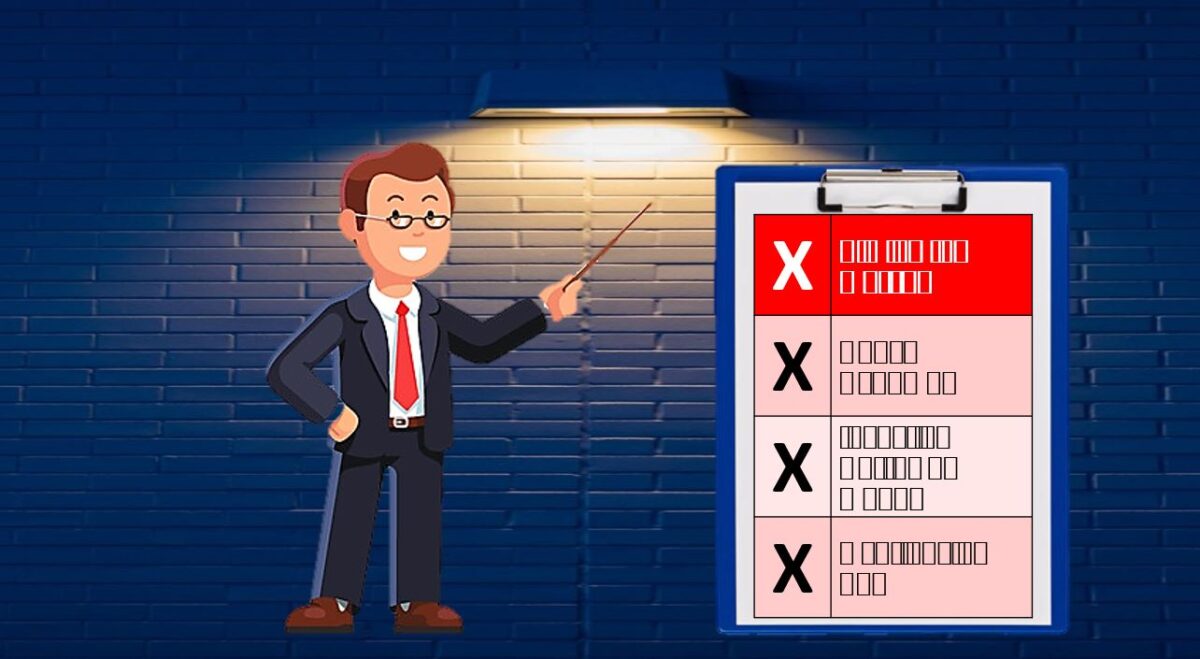There is overwhelming guidance and advice from many sources on what to do in the world of investment. But it mostly tends to be confusing. At times it becomes important to understand “What Not to Do” rather than “What to Do” as the filtered options might be more beneficial. Moreover, the list of Do’s is more contextual to a particular investor as per individual financial objectives, whereas the lists of Don’ts is likely to have a universal relevance. It is with this thought that I have tried to work out a negative list of investing.
Don’t Try to Time the Market
This is the most common folly driven by the human emotions of “Greed and Fear” which are most difficult to control. While everyone acknowledges that it is not possible to predict the highs and lows of the market, many investors rely too heavily on their own intuitions. It is not the timing of the market, but mostly the time in the market that gives better and assured returns. The recent example is the market crash due to the first COVID wave when many investors stopped their investments waiting for further lows and thereafter remained undecided when to re-enter. Subsequently many expected a similar crash due to the second COVID wave and are probably still waiting. On the other hand, the disciplined investors who continued investing on monthly basis during this entire period are sitting on handsome returns.
Don’t Buy Stocks Without Own Research
There is an overwhelming tendency in new investors to invest directly in stocks. This is partly due to the significant ease of investing due to the evolved financial technology, and mostly due to overconfidence based on limited information. Direct investments in stocks should be done only after carrying out own research and evaluating the intrinsic value of the stock. One should spend time to acquire the skills and knowledge needed for the required research. Further the access to valuable and timely information is also limited for the retail investor. Investments based on random advice and fleeting intuitions is likely to result in losses over the long term.
Don’t Overlook Tax Implications?
Taxes are a big drag on our income and it is prudent to minimise tax liability on all accounts. Investor needs to be aware of the tax implications of the particular investment/asset class and evaluate the post-tax returns to get a better understanding. There is a difference between the taxation of Debt instruments and Equity Investments. Further the tax rates depend on the tenure of holding also. An investor who indulges in frequent buying and selling might be paying far more taxes as Short-Term Gains. The patient investor who waits for the long term benefits from lower taxes and exemptions as applicable. There are some investments like Fixed Deposits and regular income schemes where the taxation is certain. Investor must either avoid these or minimize such investments.
Don’t Underplay Transaction Costs
Frequent transactions involve costs which are different for each investment and platform. Further all brokers give different schemes and cost structure which at times is difficult to understand. It is better to select a broker with least transaction costs and to minimise the number of transactions in a year.
Don’t Invest in Ponzi Schemes
There is significant awareness today regarding Ponzi schemes as compared to some years back. But there is no dearth of innovative and creative minds who keep propping up Ponzi Schemes in new forms. At times they seem genuine due to the sheer weight of players involved and the blatant public visibility. Several Financial Regulators have described the private crypto currency domain also as a large Ponzi Scheme. The investor should be cautious of anything that gives assurance of returns higher than the risk-free returns which are generally the Fixed Deposit rates. Further one needs to understand the underlying asset class, or the exact nature of business where your money is going in. Beware of the Venture Capitalists also as it is not the recommended field for a retail investor.
Don’t Invest with Borrowed Money
Investment needs money and not everybody has it in the desired quantity. There is a temptation to get some personal loan from friends or banks in the hope of making some quick profits. This is a very hazardous approach and most likely to put the investor in a very difficult financial position. It is strongly recommended that investments should be done only with own savings/earnings and not on borrowed money. This is probably one of the most important Dont’s in the Negative List of Investing.
Don’t Underplay or Overplay the Risk Factor
Risk and Return has a positive correlation. Low risk means low returns, and possibility of higher returns comes at greater risk. Most people look for avenues of high returns with no risk, something which does not exist. One needs to evaluate the risk appropriately and neither shy away from it nor overdo it. If one does not take any risk, then the wealth is likely to erode over time due to inflation. And if one indulges in excess uncalculated risk, then there is a possibility of incurring losses. One should have a balanced basket with appropriate asset diversification to minimise risk while optimising returns.


4 replies on “The Negative List of Investing”
Great article!
Great article on investment decision making! Thank you.
Very educative article, keep them coming
Very much interesting. Thank you Sir.